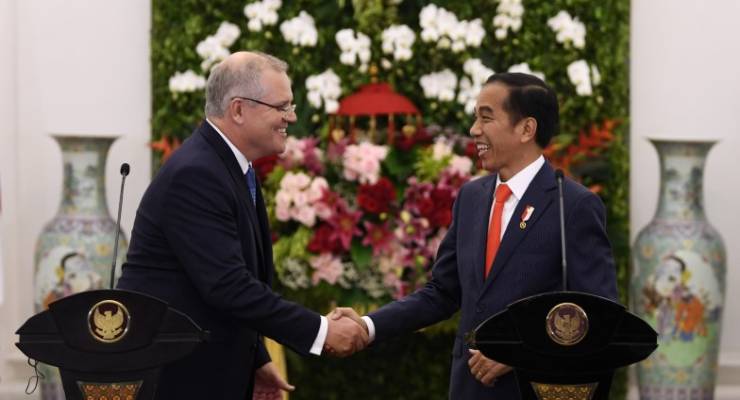
Our last two Coalition prime ministers labelled the relationship between Australia and Indonesia as one of our “most important”; now Scott Morrison has continued the tradition.
Last week our newly minted PM tweeted to congratulate Indonesian President Joko Widodo, or Jokowi, on the official announcement that he had won a second term.

With the countries’ leaders reelected within two weeks of each other, this is an interesting moment for Australia and Indonesia. Despite the nations’ seemingly close relationship, Indonesia isn’t often front and centre unless radicalism, people smuggling, national security or rowdy Aussie tourists are in the news. But with this alignment of the stars, expect Morrison to lean into the symbolism. Done right, it could be powerful.
The two leaders need to take stock of where things are between their countries. There have been significant wobbles in the past half decade amid a set of difficult regional and global economic problems. Indonesia arguably has more common threads with China, which has more commitment to the concept of the Indo-Pacific region. This is reflected in Indonesia being less vocal about its South China Sea rights than some other countries.
Like so many places, Indonesia is a county divided between conservatives and more progressive forces — and reelected Jokowi does not have as much political capital as he would have liked. The election results are, unsurprisingly, being disputed (as they were last time) by ex-Suharto son-in-law Prabowo Subianto, and have been marked by street violence that saw at least six dead. Jokowi didn’t greatly increase his majority of the vote despite bringing in conservative cleric Ma’ruf Amin as his running mate.
The good news is that there’s a decent throughline with Australian PMs and their Indonesian counterparts from Paul Keating, who got on well with the old dictator Suharto and saw the opportunities that were being ignored by Australian companies at large. Morrison needs to be careful to understand diplomatic get-togethers are not sausages sizzles. He is fortunate to have Marise Payne as Minister for Foreign Affairs who was able to take over cleanly from Julie Bishop, barely missing a beat due to her previous job as defence minister.
Indonesia, meanwhile, is heading towards the world’s top 10 economies by 2030, and forecast to be number four behind the US, China and Japan. Australian trade with Indonesia is relatively small compared with most other big ASEAN countries. Australia’s aim is now for Indonesia to be in its top 10 partners in five years time. Australia has moved its ASEAN’s trade HQ from Singapore to Jakarta — much to the chagrin of Austrade.
From Australia’s point of view the relationship is still about security: boat turnarounds, drugs and radical Islam. There is a threat of rising conservatism and although radicals seem to be somewhat controlled, deadly church bomb blasts last year are a reminder that the region is a target for Al-Qaeda and other groups (an increasing AFP presence confirms it).
Jokowi has never been as internationally focused as his predecessor Susilo Bambang Yudhoyono was; not as Asia-focused, not as focused on bilateral relationships. Now, with his second term secured and his domestic support somewhat comfortable, we may see Jokowi’s regional focus deepen.
Will Morrison be there to match it?








Hopefully the Dept. of FA will have a couple of officers rostered on shovelling food down Scomo’s throat so he doesn’t run over the top of anyone at the breakfast buffet.
How good is free food!
I don’t think size alone maketh a “top economy” – “heading towards the world’s top 10 economies by 2030, and forecast to be number four behind the US, China and Japan. ” – there is a huge qualitative difference between that trio and Indonesia.
Follwing on from AR, Michael, take a stroll about the major islands and then compare the manufacturing to Vietnam. The economy of Vietnam is wholly dominated by China (specifically the PRC).
What Indonesia produces is not accidental and is produced to provide a congruence with Vietnam for the very great benefit of China. The strategy amounts to a very sound game. Out of politeness the drunken ockers in Bali are tolerated (along with the Australian dollars – such that they are nowadays).
A more comprehensive essay would have explored the technical opportunities that exist with Indonesia keeping in mind that Indonesia is by no means “unaccompanied”. It might have also been pointed out that to consider the relationship as one of “security” – in various contexts – is to take the simple minded view.
There are some side issues (Saudi diplomacy for example) for Jokowi along with the basics of economic growth but that is all the more reason for Australia to be constructive and cooperative in technology without out having its fingers in the rice bowl. Indonesia’s Telkomsel signed a MOU with Huawei back in February to say nothing of the relationship of Huawei with Semens Indonesia.
I’ll assume that the point has been made.
Kyle
You have definitely made your point, but your Huawei triumphalism may be premature. The battle
between Huawei and others will be a long and bitter one and is far from over. If you, perchance, have
any financial relations with Huawei, either in the technological or promotions department, it may
be wise to hedge your bets for the moment.